Dog Sitter Contemplates Requesting an Increase in Previously Agreed Price After Finding Out Dog Has Separation Anxiety
The world is obsessed with dogs. Don’t believe us? Run a quick search, and you’ll find that dogs are the most popular pet choice worldwide.
If you’re wondering why they are loved so much, it’s probably because you haven’t taken the time to look at these canines. Careful, though; if you look too hard, they’ll steal your heart.
However, owning a dog may put a stop to things like spontaneous trips and will increase your responsibilities.
Thankfully, there are ways to work around this, including hiring a dog sitter. Yet, even this requires much effort, as not everyone is a suitable dog sitter.
We found a story on the AITA subreddit that highlights the stresses that come with dog sitting.
OP shared that he had agreed to dog sit for his mother’s coworker, as she was going on a trip. He had decided on charging a fee of $20 a night for five days.
However, OP soon found himself in a bind. He shared that he fell sick, and the dog was uncomfortable in its new surroundings.
After observing the dog's behavior, including the fact that it continued following his mum around, it was obvious that the dog had separation anxiety.
OP then shared that he would request his mother’s coworker to pay him $150 instead of $100 because she had failed to disclose her dog’s health issue. However, this didn't go down well with his dad.
To close the case, OP headed to the court of Reddit to ask the critical question of AITA.
An important case for the Reddit community to deliberate upon

Let's dig into the details

The story continues...
Interestingly, OP shared an update on the matter.

Understanding Canine Separation Anxiety
Separation anxiety in dogs is a well-documented behavioral condition that can significantly affect both the animal and its caretaker. According to research published in the Journal of Veterinary Behavior, symptoms can include excessive barking, destructive behavior, and attempts to escape. These behaviors stem from an attachment bond between the dog and its owner, which is particularly strong in breeds known for their loyalty.
Understanding this condition is crucial for dog sitters who may need to adjust care strategies accordingly.
Understanding and addressing separation anxiety is vital for both the dog and the caregiver's well-being. Dr. John Gottman, a renowned marriage researcher, emphasizes that "empathy and emotional intelligence are crucial in any caregiving role." By practicing patience and understanding, caregivers can create a more supportive environment for anxious dogs. As noted on his website, gottman.com, fostering a nurturing atmosphere can significantly enhance a pet's quality of life.
Understanding Separation Anxiety in Pets
Separation anxiety is a common behavioral issue in pets that can significantly impact their well-being and the owner's experience.
Dr. Lisa Martinez, a veterinary behaviorist, explains that this condition often arises from a lack of early socialization or traumatic experiences.
Her research emphasizes the need for gradual acclimatization to help pets cope with being alone.
The Reddit community gave their verdict on the matter:
"Big YTA. Sounds like he’s just being a dog and you were not prepared for dog sitting."
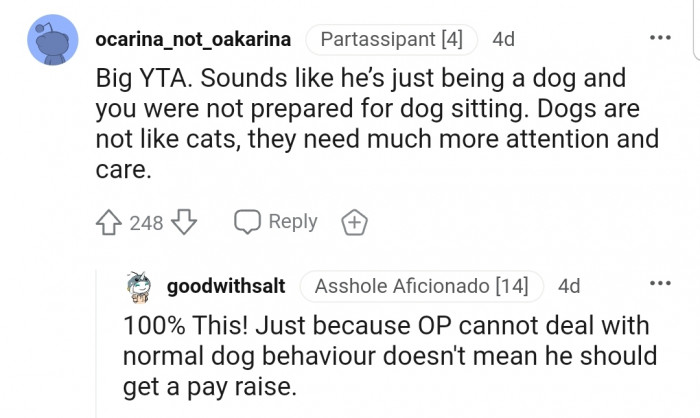
"YTA...That isn't 'separation anxiety,' it's confusion and stress, and it's completely normal."
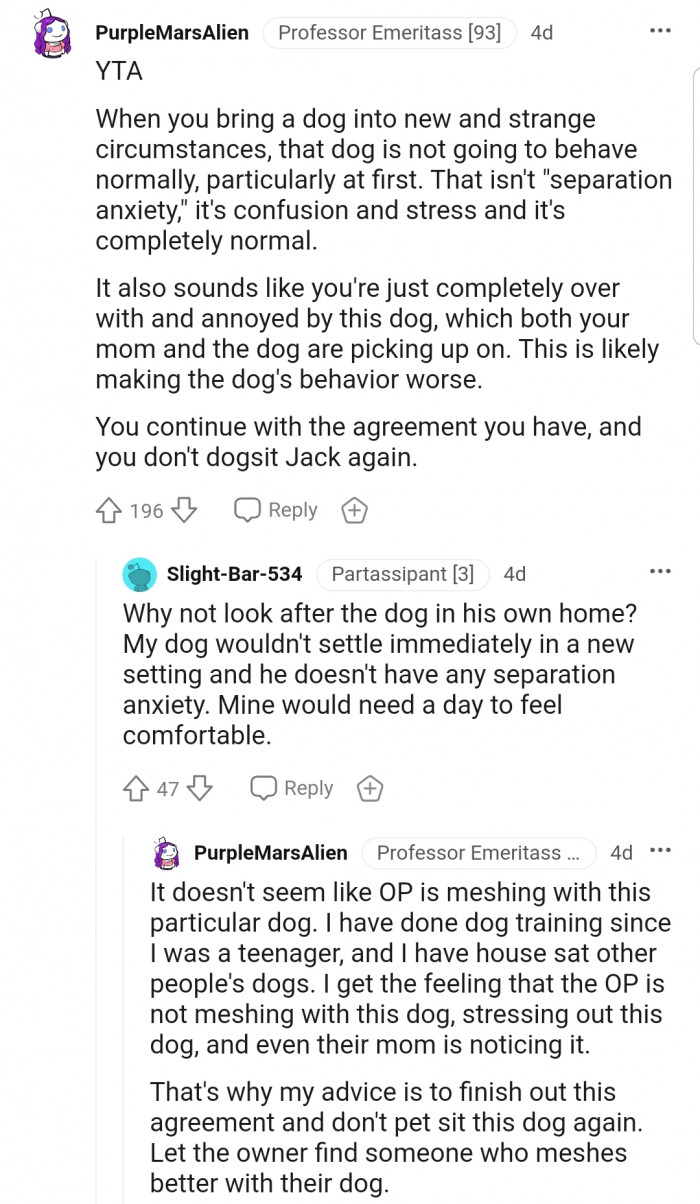
"That's not dog sitting. If I were his owner, I wouldn't even want to pay you the $100."
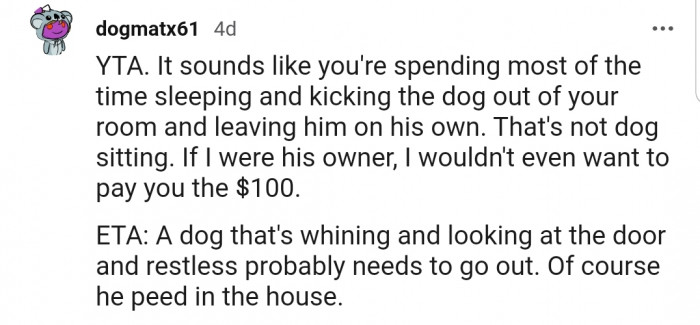
The complexities of human-animal relationships highlight the psychological underpinnings of pet ownership. According to Dr. Sonja Lyubomirsky, a happiness researcher, "Pets can significantly enhance our emotional well-being, providing companionship that alleviates feelings of loneliness." Furthermore, Dr. Ramani Durvasula, a clinical psychologist, notes that "the bond we share with our pets can lead to reduced stress and increased happiness." This strong emotional bond makes it important for caregivers to provide environments that meet the emotional needs of their pets.
Studies in the Journal of Veterinary Behavior indicate that pets with separation anxiety may exhibit destructive behaviors, excessive barking, or even self-harm.
Understanding these symptoms is crucial for caregivers to develop effective strategies to manage the condition.
"That's just a fairly normal issue with animals. They aren't happy when their surroundings change."
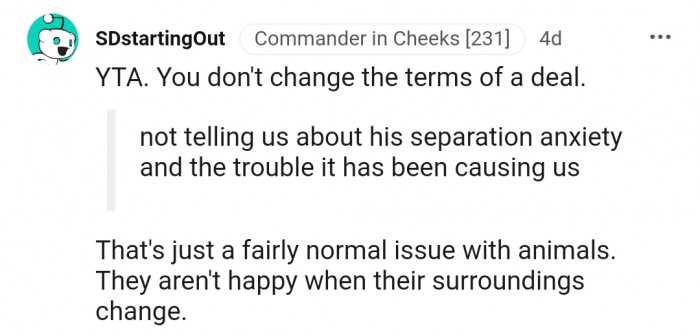
"I'm not experienced with dogs, and even I can tell you're pet sitting incorrectly."

"You said you know how to take care of dogs, but you clearly don't."
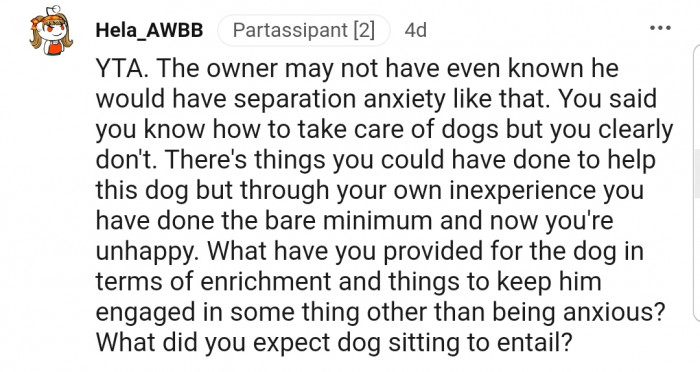
The Ethics of Pricing Adjustments
When contemplating a price increase for dog-sitting services, ethical considerations come into play. Dr. Susan David, an expert in emotional agility, emphasizes that "understanding the emotional needs of both the pet and the owner is crucial in fostering a fair negotiation." Open communication with pet owners about the extra demands of caring for an anxious dog can foster understanding and transparency. According to Dr. Adam Grant, an organizational psychologist, "people are more accepting of price adjustments when they feel the reasoning is justified," which highlights the importance of discussing the specific challenges involved in caring for a dog with separation anxiety. For more insights, visit Susan David's website and Adam Grant's website.
Addressing the Needs of Anxious Pets
Caring for a pet with separation anxiety requires patience and understanding from the caregiver.
Experts suggest implementing gradual departures and providing engaging toys to keep the pet occupied while alone.
These strategies can significantly reduce anxiety and improve the pet's quality of life.
"Don't try to renegotiate the money. Be a class act; don't complain about the dog when you return him."
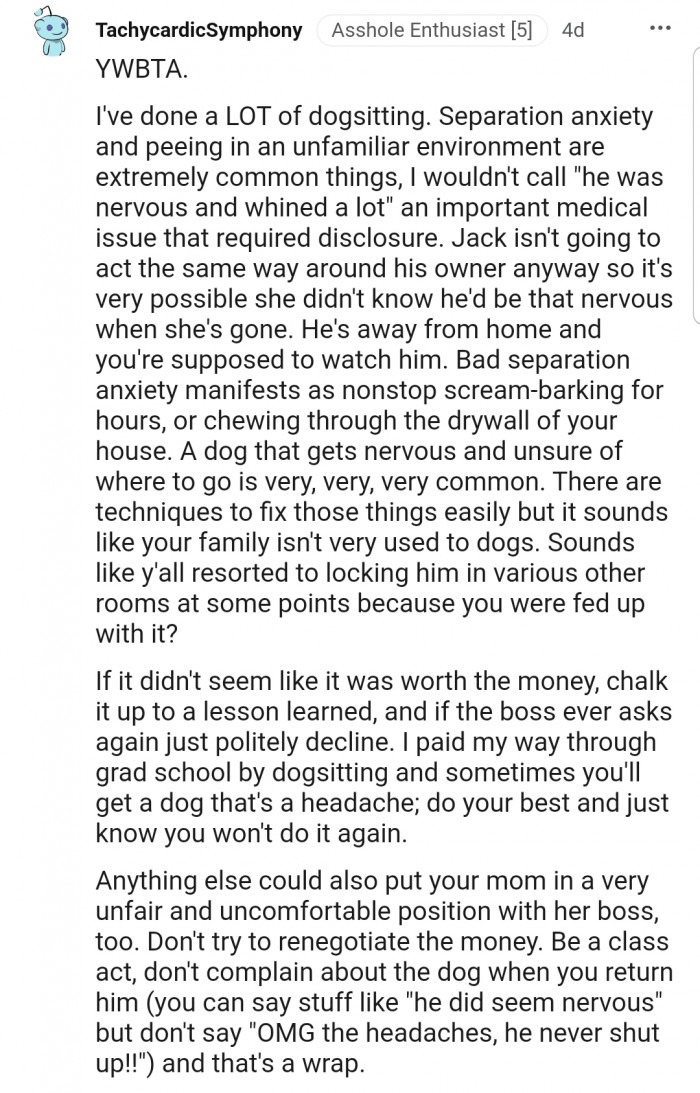
"There is a very good chance that some of the whining is from being locked inside all day and not getting any physical/mental stimulation."

"YTA. Sounds like the dog just isn’t given proper attention."

Behavioral strategies can help manage a dog's separation anxiety effectively. Experts recommend gradual desensitization techniques, which involve slowly getting the dog accustomed to being alone for short periods. A study from the Journal of Veterinary Behavior confirms that this method can significantly reduce anxiety symptoms over time.
Additionally, incorporating interactive toys or calming music can provide distraction and comfort for the dog during separation.
Additionally, seeking assistance from a veterinary behaviorist can provide tailored strategies and support.
Working with professionals can lead to a more comprehensive understanding of the pet's needs and how to address them effectively.
Moreover, training and socialization techniques can help alleviate anxiety over time.
"You aren't doing a good job dog sitting, and now you want to raise the price? YTA."

"Honor the agreed-upon terms, and if asked to dog-sit again, then renegotiate the price."

"The owner might not have known about the separation anxiety."

Building Stronger Bonds
The bond between a dog and its caregiver is crucial for emotional stability. According to attachment theory, as proposed by Bowlby, secure bonds lead to healthier behaviors. Research indicates that dogs mirror human emotional states, reinforcing the need for stable caregiving environments.
Pet owners should be encouraged to engage in activities that strengthen this bond, such as regular exercise and training sessions, which can alleviate anxiety and promote behavioral well-being.
"The onus is on you to ask questions like this. Most professional dog sitters know what questions to ask (and know how to deal with anxiety issues)."

The Reddit community unanimously agrees that OP is the A-hole, as he didn't seem to do a good job taking care of the dog.
However, OP wasn't going to swallow the bashing without a response. In an edit to his original post, he argued his expertise in catering to dogs and even highlighted his vast experience.
You’re the judge now. Do you think OP is the A-hole in this situation? Let us know your thoughts in the comments below!
Psychological Analysis
This situation highlights the complexities of caring for a pet with separation anxiety.
Understanding the underlying causes and implementing effective strategies is essential for ensuring the well-being of both the pet and the caregiver.
Analysis generated by AI
Analysis & Alternative Approaches
In summary, understanding separation anxiety in pets is essential for improving their well-being and enhancing the caregiving experience.
By implementing appropriate strategies and seeking professional support, caregivers can create a more harmonious environment for anxious pets.
Ultimately, awareness and patience are key to navigating these challenges successfully.
Research-Based Understanding
In summary, navigating the complexities of caring for a dog with separation anxiety requires a blend of empathy, understanding, and informed decision-making. Research highlights the importance of secure attachments, as well as the effectiveness of behavioral interventions in alleviating anxiety symptoms.
By fostering open communication regarding care needs and adjustments in pricing, dog sitters can create a more supportive environment for both themselves and the animals they care for. This balance can ultimately lead to healthier relationships and improved outcomes for all involved.



